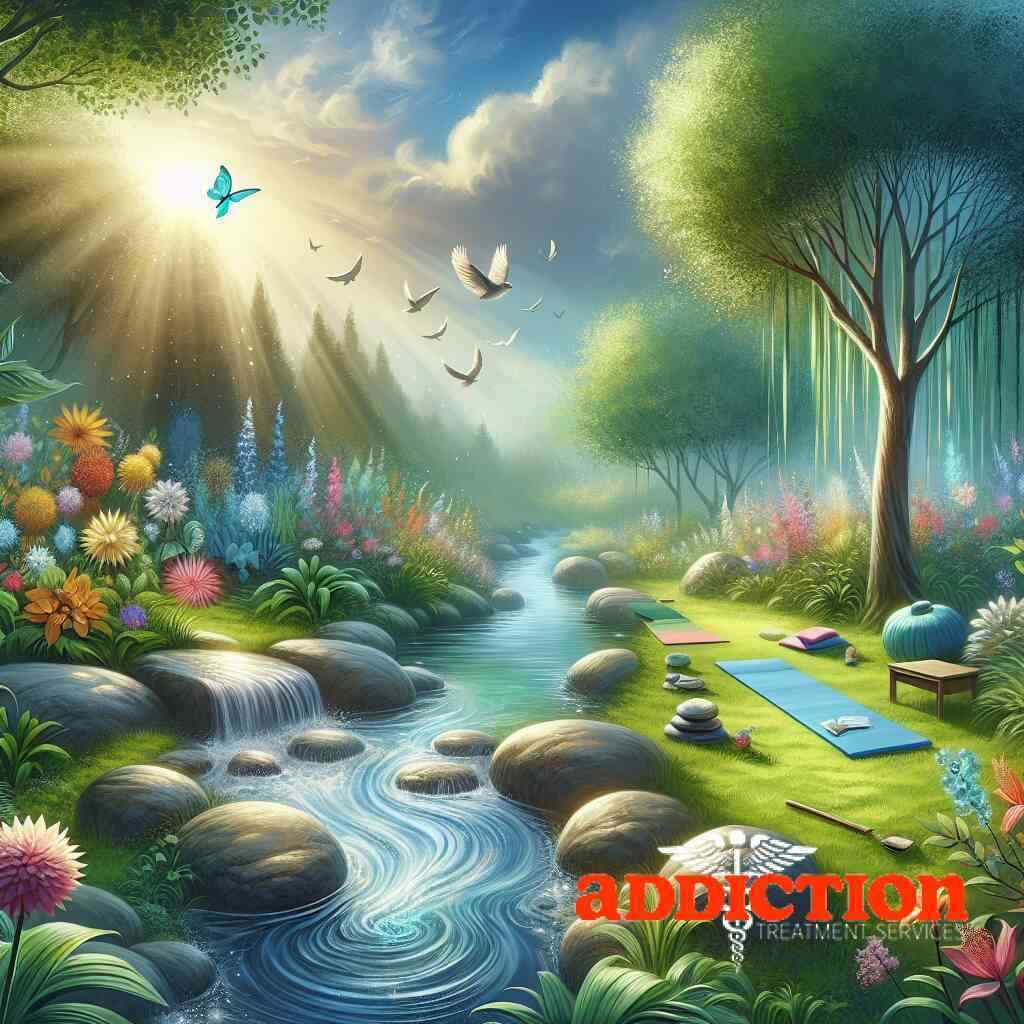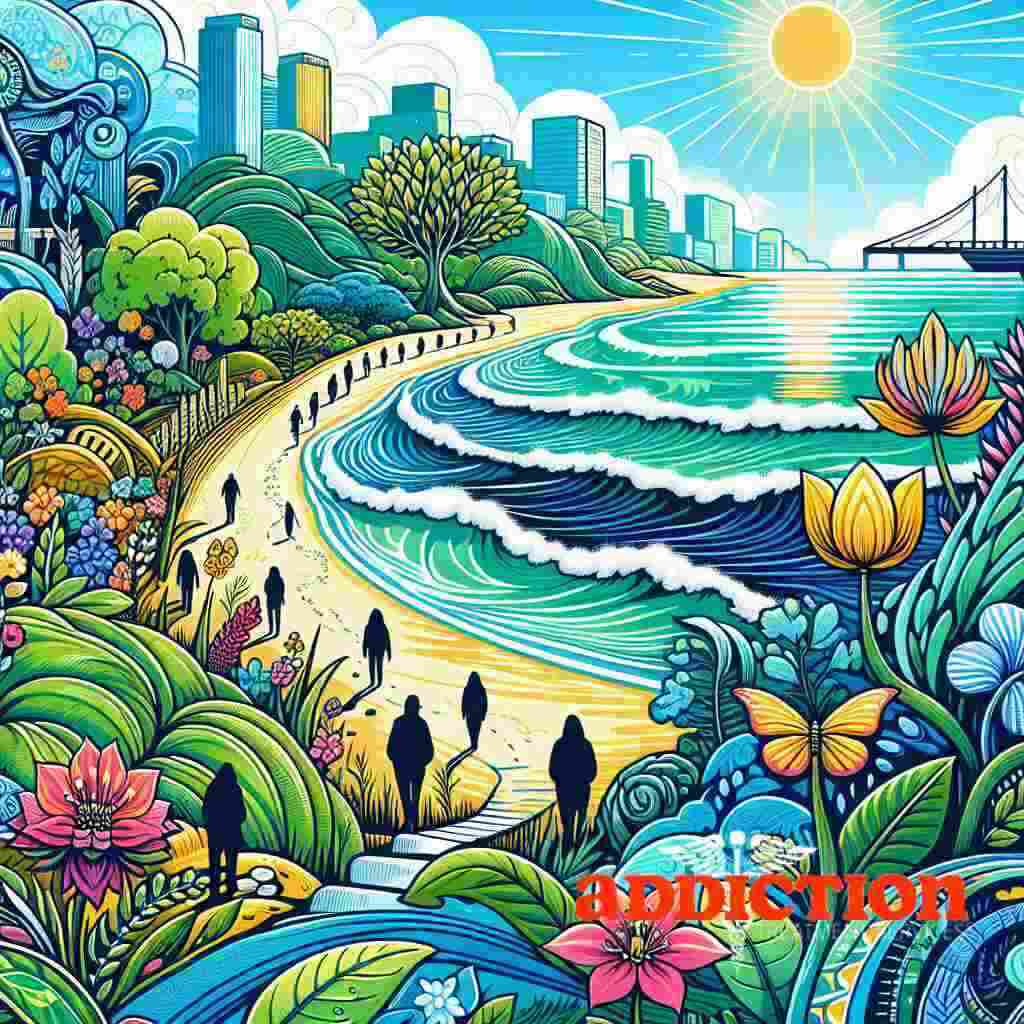 Posted On: 05/10/2025
Posted On: 05/10/2025Embarking on a Transformative Journey
Understanding Holistic Recovery in the Context of Modern Treatment
Holistic recovery represents a paradigm shift in addiction treatment by addressing the comprehensive needs of individuals battling substance use disorders. This approach extends beyond alleviating physical dependencies, recognizing that recovery should encompass mental, emotional, and spiritual wellness. Addiction Treatment Services guides you through these multifaceted recovery processes, simplifying the complex search for both traditional and alternative therapies in substance use recovery. As treatments evolve, holistic methodologies become vital, offering new avenues for recovery alongside conventional methods to enhance overall well-being. Understanding this holistic context enables individuals to engage with treatment centers that provide integrative care, ensuring a well-rounded recovery journey tailored to personal needs.
The Intersection of Traditional and Holistic Approaches
The collaboration between traditional and holistic approaches in addiction treatment centers has led to more effective and sustainable recovery outcomes. Conventional methods, such as detoxification and medication-assisted therapy, lay the foundation by physically addressing addiction. In contrast, the holistic methods focus on the mind-body connection in therapy for emotional and psychological healing. Treatment centers are increasingly integrating these approaches, encouraging individuals to explore the mind-body connection and fostering an environment conducive to both spiritual and personal growth. Addiction Treatment Services is committed to providing insights into such integrative strategies, promoting a nuanced understanding of the healing process that advocates for both evidence-based practices and holistic healing methods.
Setting the Stage for Whole-Person Healing
Whole-person healing is at the core of holistic recovery, emphasizing the importance of treating not just the addiction but the entire individual. Substance use disorders are complex, often intertwined with underlying mental health conditions and emotional challenges that require a comprehensive treatment plan. By setting the stage for such healing, addiction treatment centers can offer a suite of services designed to address the myriad facets of recovery, such as emotional resilience, cognitive-behavioral therapies, and spiritual wellness. This overall holistic approach aligns with the mission of Addiction Treatment Services to guide individuals in finding treatment programs that resonate with their unique recovery journeys, facilitating a path toward comprehensive wellness and enduring sobriety.
The Cornerstones of Holistic Recovery
Exploring the Mind-Body Connection
The mind-body connection stands as a pivotal component in holistic addiction recovery. By recognizing the interdependence of mental and physical health, treatment centers can tailor therapies that address these dimensions simultaneously. This dynamic interaction enhances emotional regulation and resilience, vital for long-term recovery from substance use disorders. At Addiction Treatment Services, we advocate for therapies that explore this intricate connection, facilitating not just physical healing but mental wellness as well. Such an approach acknowledges the complexities of addiction, aiming to harmonize mind and body through personalized care strategies that foster sustainable recovery outcomes.
Incorporating mindfulness techniques into rehabilitation programs bolsters this connection, promoting a state of self-awareness that aids in managing stress and cravings. The mind-body connection in therapy can be pivotal for individuals grappling with the psychological aspects of addiction, providing them with tools to navigate emotions and mental health challenges effectively. These strategies encourage patients to engage deeply with their recovery journey, fostering a holistic understanding of their health.
Integrative Treatment Strategies
Integrative treatment strategies blend traditional and alternative practices, offering a comprehensive framework for addressing addiction. Such strategies prioritize holistic principles, customizing care plans that include both medical interventions and complementary therapies. By leveraging the strengths of diverse treatment modalities, individuals receive a robust support system tailored to their unique recovery needs. Addiction Treatment Services provides insight into various integrative recovery strategies available at treatment centers to help you identify the best path for your circumstances.
These integrative approaches ensure continuity of care, emphasizing whole-person healing through a coordinated effort among healthcare providers. As holistic treatment becomes increasingly recognized, integrating various therapies, such as cognitive-behavioral therapy alongside acupuncture or yoga, emerges as a best practice. These multifaceted strategies not only treat the addiction but also address its underlying causes, promoting a balanced approach that increases the likelihood of a successful and enduring recovery.
Harnessing the Power of Complementary Therapies
Complementary therapies enhance the recovery process by supporting traditional addiction treatment methods through non-invasive and natural approaches. Practices like yoga, meditation, and mindfulness offer avenues for individuals to enhance their emotional and physical wellness. These therapies serve as powerful adjuncts in treatment plans, providing benefits such as improved focus, emotional regulation, and stress reduction. Yoga for balance and wellness has become an integral part of many holistic recovery programs, aiding individuals in achieving mental clarity and physical vitality.
Other complementary therapies, such as acupuncture and herbal remedies, offer detox support and contribute to emotional well-being during rehabilitation. These therapies can help manage withdrawal symptoms, reduce stress, and prevent relapse, encapsulating the essence of sobriety through complementary practices. Addiction Treatment Services’ commitment to offering comprehensive resources and guidance empowers individuals to explore these therapies, optimizing their potential to achieve a balanced and fulfilling recovery experience.
Therapeutic Modalities in Holistic Treatment

Yoga and Meditation Practices for Emotional and Physical Balance
Yoga and meditation stand at the forefront of holistic recovery, serving as powerful tools for achieving emotional and physical equilibrium. These practices enhance self-awareness, promoting a deep connection between mind and body, crucial for individuals grappling with the challenges of substance use disorders. Engaging in regular yoga sessions can improve physical strength, flexibility, and balance while helping to reduce stress and anxiety levels. Meditation complements yoga by fostering a state of mindfulness, encouraging individuals to focus on the present moment, which is instrumental in coping with cravings and emotional turbulence during recovery.
Furthermore, yoga and meditation practices are accessible and adaptable, allowing for customized routines that align with individual needs and abilities. These modalities promote sustainable lifestyle changes that pave the way for lasting recovery, integrating seamlessly into the holistic care practices offered by addiction treatment centers. By incorporating these disciplines into recovery programs, individuals can cultivate emotional resilience, enhance physical vitality, and foster overall wellness, making yoga and meditation invaluable components of holistic recovery strategies.
Acupuncture and Herbal Remedies for Supporting Detoxification
Acupuncture and herbal remedies are renowned for their supportive role in detoxification, offering natural pathways to ease withdrawal symptoms and promote healing. Acupuncture is a traditional Chinese medicine practice that involves inserting thin needles into specific body points to stimulate healing and alleviate discomfort associated with detoxification. This treatment modality helps manage withdrawal symptoms, reduce anxiety, and support overall physical recovery.
Herbal remedies, often used in conjunction with acupuncture, provide additional benefits for individuals during detoxification and rehabilitation. These remedies can include a variety of herbs known for their detoxifying properties, aiding the body’s natural processes to expel toxins. By integrating acupuncture and herbal approaches into treatment plans, holistic recovery programs offer comprehensive support for individuals seeking alternative treatments to reinforce traditional medical therapies. As such, these modalities are integral to achieving a balanced approach to recovery, aligning with the overall objectives of wellness-oriented treatment centers.
Art and Music Therapy as Catalysts for Emotional Expression
Art and music therapy offer unique opportunities for emotional expression and play a pivotal role within holistic addiction recovery frameworks. These therapies provide creative outlets for individuals to explore and communicate their feelings, facilitating an in-depth understanding of their emotional landscapes. Engaging in art and music therapy encourages individuals to work through their emotions, often providing insights that verbal communication alone may not uncover.
Furthermore, art and music therapy serve as powerful catalysts for healing, with potential benefits that include reduced stress, improved mood, and enhanced self-esteem. For many, these forms of therapy create a safe space for self-exploration and healing, enabling participants to gain clarity and develop coping strategies for the challenges of recovery. These expressive therapies support emotional well-being in rehabilitation, complementing other holistic practices and contributing to a comprehensive treatment strategy aimed at fostering personal growth and sustainability in sobriety.
Redefining Wellness in the Recovery Process
Spiritual Wellness and Energy Healing Modalities
Spiritual wellness is an integral component of holistic recovery, bringing profound depth and meaning to the healing process. In this context, energy healing modalities emerge as transformative practices that can recalibrate an individual’s energy fields, facilitating deeper spiritual connection and introspection. The incorporation of energy healing in addiction recovery, such as Reiki or therapeutic touch, can aid individuals in uncovering underlying emotional patterns tied to substance abuse. By addressing the spiritual needs of those in recovery, treatment centers offer pathways to connect with personal beliefs and values, fostering a sense of peace and purpose essential for long-term recovery.
Spiritual wellness often interlinks with community activities, such as spiritual wellness in recovery sessions and holistic treatment centers. Integrating group meditations or prayer circles can fortify a supportive environment where individuals cultivate inner strength and harmony. Such practices highlight the importance of acknowledging spirituality as a pillar in holistic addiction recovery, encouraging a fulfilling exploration of personal growth and healing.
Promoting Emotional Resilience through Mindfulness
Mindfulness stands at the forefront of building emotional resilience in the recovery process. As individuals navigate the complexities of addiction recovery, practicing mindfulness facilitates awareness of present emotions without judgment. This technique empowers them to respond to challenges thoughtfully rather than reacting impulsively. The use of mindfulness for emotional resilience equips individuals with coping mechanisms to manage stress and anxiety, essential elements for maintaining sobriety.
Incorporating mindfulness into therapeutic settings enables individuals to recognize triggers and emotional patterns associated with substance use. Mindfulness training programs, such as mindful breathing exercises or guided imagery, enhance self-regulation and promote emotional balance. These practices support recovery by fostering a proactive mindset, allowing individuals to cultivate acceptance and resilience, ultimately leading to sustained wellness beyond traditional treatment.
Naturopathic Medicine in Addiction Recovery
Naturopathic medicine plays a pivotal role in holistic addiction recovery, offering natural and tailored interventions that align with an individual’s unique healing journey. This approach emphasizes the body’s inherent ability to heal, supporting recovery with treatments that complement conventional medical practices. Through the application of naturopathic medicine in substance use treatment, individuals have access to herbal supplements, nutritional counseling, and lifestyle modifications aimed at restoring physical and mental health.
The holistic nature of naturopathic practices encourages a whole-body healing approach. By focusing on dietary changes, vitamin supplementation, and detoxification, individuals experiencing withdrawal symptoms may find relief and enhanced recovery outcomes. This multifaceted treatment modality broadens the scope of care, emphasizing preventive health and natural remedies that synergize with integrative treatment plans. Employing naturopathy in addiction recovery reaffirms the commitment to treating the root causes of addiction, ensuring a comprehensive path to long-lasting sobriety.
Challenges and Triumphs of Holistic Treatment Centers
Navigating Integration with Traditional Treatment Programs
Holistic treatment centers are continually evolving to integrate their methodologies with traditional addiction treatment programs effectively. The primary challenge lies in harmonizing these diverse approaches without diluting the essence of holistic recovery methods. While traditional programs focus heavily on detoxification services and medication-assisted treatment, holistic centers thrive on balancing physical, mental, and spiritual health through a whole-person care approach. This integration requires detailed coordination where complementary therapies, such as yoga therapy or meditation practices, align seamlessly with traditional medical interventions.
This synergy between the two paradigms fosters a comprehensive recovery framework that enhances overall patient outcomes. To navigate these complexities successfully, treatment centers implement structured training for staff to promote awareness and competency in both traditional and holistic practices. By creating collaborative environments that emphasize communication and shared goals, the integration process becomes smoother, fostering a holistic healing environment that respects all elements of an individual’s recovery journey.
Addressing Skepticism and Building Credibility
Skepticism toward holistic recovery methods is prevalent in addiction treatment. Many individuals and family members seeking addiction treatment services near them may question the efficacy of alternative therapies compared to well-established medical approaches. Building credibility involves extensive education and advocacy to illuminate the benefits and validity of holistic methods, such as herbal remedies for detoxification or energy healing practices. This challenge drives centers to provide evidence-based data to substantiate the positive impact of holistic therapies on long-term recovery success.
Developing partnerships with mainstream medical facilities and engaging in community outreach programs helps mitigate skepticism. By demonstrating successful case outcomes, offering free introductory sessions, and sharing patient testimonials, holistic treatment centers can gradually dismantle misgivings and promote widespread acceptance. Emphasizing a balanced approach in treatment centers highlights the potential for holistic care to complement traditional therapies, ultimately encouraging more individuals to embrace these empowering recovery tools.
Case Studies: Success Stories from Holistic Treatment Programs
Case studies from holistic treatment programs across the country provide compelling evidence of the transformative power of balanced care approaches. In states like Georgia, for example, addiction recovery therapies have showcased substantial strides in patient outcomes through integrative care models. These success stories often involve individuals who engage in therapies that merge traditional treatments with innovative holistic modalities, like acupuncture for addiction or art therapy in recovery.
These narratives highlight the triumphs of combining spiritual wellness practices and naturopathic medicine with conventional recovery support services. By charting the journeys of those who have achieved sobriety through complementary therapies, treatment centers can portray a vivid picture of the potential within holistic recovery frameworks. These success stories serve as powerful testimonials, illustrating how holistic recovery methods can lead to profound and lasting changes, providing hope and inspiration for new patients beginning their transformative journey toward wellness.
Moreover, as these programs continue to evolve, the blending of innovative therapies with established practices lays the groundwork for future perspectives on holistic recovery, further enhancing the credibility and appeal of holistic addiction treatment centers.
Creating a Sustainable Path Forward
Holistic Lifestyle Changes for Lasting Recovery
Transitioning into lasting recovery requires individuals to adopt holistic lifestyle changes that promote sustained sobriety. These changes encompass physical, emotional, and spiritual dimensions of wellness, fostering a resilient foundation for individuals as they navigate their recovery journeys. Incorporating daily practices like meditation and yoga into one’s routine can enhance emotional stability and mental clarity, both critical for long-term recovery success. Moreover, adopting a balanced diet rich in nutrients supports physical health, while reducing stress and preventing relapse.
Holistic recovery’s emphasis on whole-person care underscores the importance of addressing every aspect of well-being. By integrating mindfulness practices into daily life, individuals can achieve a harmonious balance between body and mind, which is crucial for enduring sobriety. Addiction Treatment Services advocates for such sweeping lifestyle changes, providing clients with resources and guidance to implement these elements in their daily lives, paving the way for ongoing recovery and sustained wellness.
Future Perspectives on the Role of Holistic Therapies
As addiction treatment evolves, the future of holistic therapies appears promising, with innovative practices continuing to emerge. Holistic therapies, recognized for their efficacy in addressing addiction’s multifaceted nature, have garnered acceptance within mainstream treatment frameworks. This integration reflects a growing acknowledgment of the benefits that holistic therapies bring to traditional recovery models. New approaches and methodologies are continually explored, enhancing the therapeutic landscape for addiction recovery.
Looking to the future, treatment centers aim to expand their offerings by incorporating advances in holistic practices, such as energy healing and naturopathic remedies. Such therapies can offer new models for addressing substance use disorders, rooted in a deep understanding of emotional well-being and spiritual wellness. These perspectives assure a broader acceptance of holistic methodologies, aligning with Addiction Treatment Services’ mission to provide comprehensive treatment options that resonate with each individual’s unique needs.
A Vision for Comprehensive Care in Addiction Recovery Centers
Addiction recovery centers are poised to redefine comprehensive care by fully integrating holistic therapies with traditional treatment models. This vision hinges on creating personalized care plans that recognize the diverse paths individuals may take toward recovery. By embracing holistic therapies alongside conventional practices, treatment facilities can offer a richer, more nuanced approach that caters to every dimension of a patient’s well-being.
This shift necessitates a commitment to training and employing professionals skilled in both traditional and holistic healing techniques. Emphasizing the importance of cross-disciplinary approaches ensures patients receive targeted care that addresses all facets of recovery. As centers evolve, they are increasingly focused on delivering whole-person healing approaches for those seeking recovery. Such comprehensive strategies ensure that individuals not only overcome substance misuse but also achieve profound personal growth and lasting sobriety. By prioritizing a balanced approach, recovery centers uphold a commitment to transformative change, making sobriety through complementary therapies more accessible and effective across the nation.
Conclusion: Embracing a Holistic Future in Addiction Recovery
Reflecting on the Role of Holistic Recovery
As we reflect upon the transformative power of holistic recovery, it becomes clear that this approach is more than a mere trend; it’s a meaningful shift toward comprehensive wellness. Holistic recovery at treatment centers offers individuals battling substance use disorders and opportunity to heal on multiple levels- physical, emotional, mental, and spiritual. By moving beyond the singular focus of traditional treatments, holistic recovery embraces the complexity of human experiences, crafting personalized paths to sobriety. This multifaceted approach empowers individuals to overcome addiction while fostering a deeper understanding of themselves and their wellness journeys. Holistic recovery underscores the profound potential for long-term sobriety through complementary therapies, inviting individuals toward a renewed and sustainable lifestyle.
Emphasizing the Importance of Integrative Treatment
Integrative treatment is the cornerstone upon which sustainable recovery is built. At the heart of this strategy is the acknowledgment that recovery from addiction thrives best when all areas of a person’s life are addressed. Holistic therapies such as yoga, meditation, and nutritional guidance, combined with traditional methods like detoxification and medication-assisted treatment, form a cohesive care strategy. This fusion not only tackles the physical addiction but also fosters emotional resilience and mental clarity by emphasizing integrative treatment. Addiction treatment centers can offer holistic recovery as part of their comprehensive care plans. This approach ensures continuity of care, utilizing innovative therapies and traditional practices, creating a robust system designed to address the unique needs of each individual.
Calling for a Balanced Approach in Treatment Centers
To truly make strides in combating the pervasive issue of substance misuse, treatment centers must champion a balanced approach that incorporates both traditional and holistic recovery methods. This harmonious method respects the proven efficacy of medication and intensive outpatient programs while innovatively integrating holistic modalities to address wellness from all angles. Encouragingly, such a balanced approach can be seen gaining traction in states like Georgia. By expanding the spectrum of available treatments in addiction recovery therapies in Georgia, centers create a more inclusive environment conducive to varied healing processes. Through these holistic recovery challenges, treatment facilities are called upon to adapt thoughtfully, setting new standards for comprehensive and effective care. This balanced approach holds the promise of reshaping the future of addiction treatment, leading to more effective recovery outcomes and successful, long-lasting sobriety.
Frequently Asked Questions
Question: How does holistic recovery contribute to a comprehensive addiction treatment plan at Addiction Treatment Services?
Answer: Holistic recovery plays a pivotal role in creating a comprehensive addiction treatment plan by addressing not only the physical aspects of addiction but also the emotional, mental, and spiritual dimensions. At Addiction Treatment Services, we recognize the complexity of substance use disorders and strive to guide individuals toward integrative treatment strategies that include both traditional medical interventions and alternative therapies. This approach helps to ensure a well-rounded recovery process, fostering long-term sobriety by promoting a whole-person care approach that is tailored to individual needs.
Question: What alternative therapies does Addiction Treatment Services recommend as part of the holistic recovery process?
Answer: Addiction Treatment Services recommends a variety of alternative therapies as part of the holistic recovery process. These include yoga and meditation practices, which enhance emotional and physical balance, acupuncture and herbal remedies that support detoxification, and art and music therapy for emotional expression. By incorporating these complementary therapies, individuals can engage deeply with their recovery journey, fostering a strong mind-body connection and improving emotional resilience. Our integrative treatment strategies are designed to empower individuals to achieve sustainable wellness alongside conventional treatments.
Question: In the blog titled ‘What is the Role of Holistic Recovery at Treatment Centers’, how is the intersection of traditional and holistic approaches explained?
Answer: In the blog ‘What is the Role of Holistic Recovery at Treatment Centers, the intersection of traditional and holistic approaches is explained as a collaborative paradigm that enhances overall recovery outcomes. Traditional methods such as detoxification and medication-assisted treatment form the foundation of addiction treatment by addressing the immediate physical dependencies. Meanwhile, holistic healing methods, including mindfulness in addiction treatment and spiritual wellness practices, focus on the mental and emotional challenges. This integrative approach allows individuals to address their substance use disorders comprehensively, promoting a balanced recovery path that ensures both immediate relief and long-term transformative change.
Question: Can you elaborate on the importance of the mind-body connection in holistic addiction recovery?
Answer: The mind-body connection is a critical component of holistic addiction recovery, emphasizing how mental and physical health are intimately linked. At Addiction Treatment Services, we advocate for therapies that enhance this connection, such as incorporating mindfulness practices into daily routines. These practices help individuals gain self-awareness, manage stress, and navigate cravings effectively, supporting their mental well-being. By focusing on this dynamic interaction, individuals enhance their emotional regulation and build resilience, which are vital for long-term recovery. Our holistic addiction recovery programs integrate these practices to foster comprehensive wellness and sustained sobriety.
Question: What role does spiritual wellness play in the holistic recovery process at addiction treatment centers?
Answer: Spiritual wellness is a cornerstone of the holistic recovery process at addiction treatment centers, offering individuals a deeper sense of purpose and meaning in their recovery journey. At Addiction Treatment Services, spiritual wellness practices such as energy healing and community-focused activities like group meditation or prayer circles are integral to holistic care practices. These modalities encourage individuals to explore their personal beliefs and values, fostering inner peace and resilience essential for ongoing recovery. By addressing spiritual needs, treatment centers can provide a more profound and enriching recovery experience, ultimately contributing to an enduring path of sobriety and personal growth.



